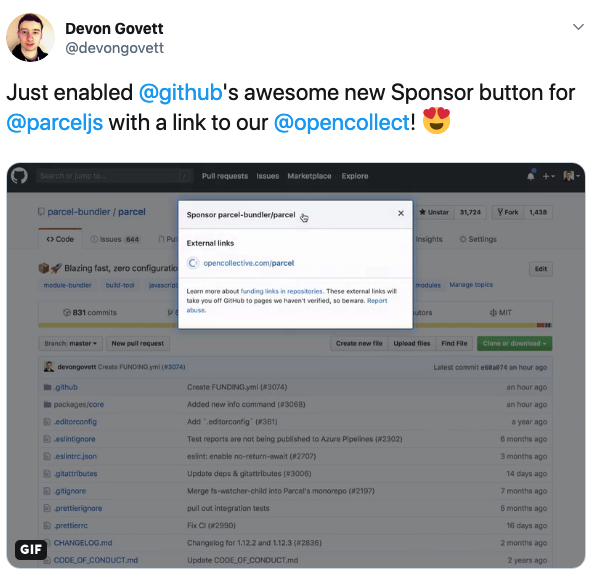On Github Sponsors
Why we welcome it, and four ways Open Collective is different

Why we welcome it, and how Open Collective is different
The announcement from GitHub about their new Sponsors feature has triggered a flurry of mentions in my Twitter feed. I’d like to build on the thoughts I originally shared in this series of Tweets.
First and foremost, I am really happy to see such an important player in the ecosystem helping out with problem of sustaining open source. Sustaining our commons is an effort that requires everyone to contribute, so I am glad to see Github come on board.
Also, we’re very excited about the announcement of the new FUNDING.yml option, meaning you can add a sponsor button in your repository to increase the visibility of funding options for your open source project. This is great news for the whole ecosystem.

How is Open Collective different?
1. Open Source
It’s pretty straightforward: we serve the open source community, so our code is free and open.
2. Fully Transparent
Everyone can see where the money comes from and where it goes, in every Collective. (We run our company itself as a transparent Open Collective, too.) This is key to help projects maintain independency: how much the different players invest in a project is open to everyone.
3. Built for Projects
Fund the community, not the individual. If the original founder moves on, the financial support can continue. Decentralize power and decision-making among all core contributors. This decreased burnout, increases bus factor and helps achieve a more balanced and healthier ecosystem, for everyone. This is why we’ve happily coexisted alongside Patreon for a long time already, and can happily coexist with GitHub Sponsors, too.
4. Fiscal Sponsorship
The Open Source Collective 501(c)(6) non-profit serves as a legal and financial commons for nearly 1200 open source projects, and takes care of all the taxes, accounting, and financial admin behind the scenes. Without fiscal sponsorship, you need to manage all that on your own, and if you don’t already have a company set up, it’s a pretty big deal.
I’ve heard concerns about whether the people behind GitHub Sponsors are doing it for the right reasons. Yes, I think that @devonzuegel and @natfriedman are genuinely thinking about supporting the open source ecosystem.
Of course, there’s risk: centralization and lock-in are very risky for communities. GitHub is Microsoft, which has its own metrics in mind, and it will be difficult for them to be independent, regardless of the good faith of the folks involved.
Attempting to own all aspects of the open source community is a harmful strategy. So far, I don’t think GitHub is trying to do this. They are in a position to help, and they are open to collaborating with existing players.
Does it compete with Open Collective? To some extent. But our growth has never been primarily driven by individuals giving to individuals, but by companies giving to projects. GitHub Sponsors does not solve the need sponsor companies have for invoices and a legal entity to engage with for their vendor systems and documentation requirements.
Open Collective’s fiscal sponsorship service means you don’t have to get the money out within 30 days (the case with GitHub Sponsors), which enables groups to plan better and be sustainable in the long term. Project can raise, save, and spend money—on things like trips to conferences, hardware, software, and meetups—without one person having to hold the money for everyone.
It also means that we can manage the 1099s, tax forms, payouts and expenses for the projects, as a Collective. This is not the case with GitHub Sponsors, and I don’t see Microsoft going into this business. If you accept funds individually from GitHub and then want to use them to support other contributors to your project or collective expenses, it’s going to get messy.
Open Collective provides full transparency of where money comes from and how it’s spent. This is hugely important to ensure that the independence of projects is maintained. You can easily see how much a given player invests. On the positive side, sponsors can show off their support for open source across multiple projects in one place.
Open Collective is for funding projects as opposed to individual maintainers. We strongly believe in supporting communities as a whole, as well as the individuals that make up that community. This helps with ensuring more diversity, and less concentration of power and decisions on one maintainer.
It also means lower burnout risk. If someone wants to move on from a project, the funding doesn’t disappear. It stays in the community and can be used to support the next wave of maintainers, limiting the bus factor and building a healthier ecosystem.
Finally, Open Collective is open source. You will always be able to fork it. We will never be able to lock anyone in. This matters. You can take your money and your data out at any time, because it’s yours.
As I said, every time a new player joins us in our mission to sustain open source, we welcome them. We are here to collaborate! ❤

